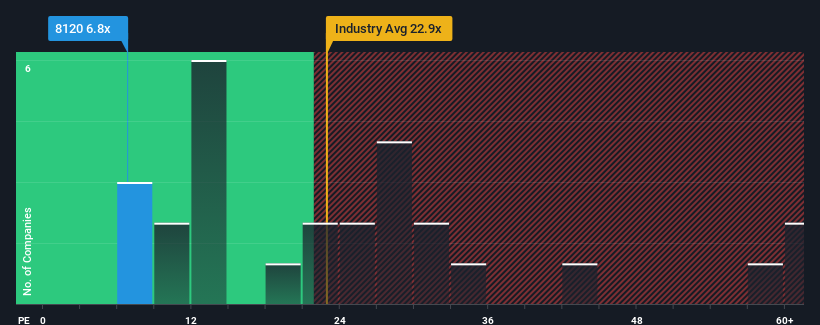- Saudi Arabia
- /
- Insurance
- /
- SASE:8120
Benign Growth For Gulf Union Alahlia Cooperative Insurance Company (TADAWUL:8120) Underpins Its Share Price

Gulf Union Alahlia Cooperative Insurance Company's (TADAWUL:8120) price-to-earnings (or "P/E") ratio of 6.8x might make it look like a strong buy right now compared to the market in Saudi Arabia, where around half of the companies have P/E ratios above 26x and even P/E's above 41x are quite common. However, the P/E might be quite low for a reason and it requires further investigation to determine if it's justified.
Recent times have been quite advantageous for Gulf Union Alahlia Cooperative Insurance as its earnings have been rising very briskly. One possibility is that the P/E is low because investors think this strong earnings growth might actually underperform the broader market in the near future. If that doesn't eventuate, then existing shareholders have reason to be quite optimistic about the future direction of the share price.
Check out our latest analysis for Gulf Union Alahlia Cooperative Insurance

Does Growth Match The Low P/E?
Gulf Union Alahlia Cooperative Insurance's P/E ratio would be typical for a company that's expected to deliver very poor growth or even falling earnings, and importantly, perform much worse than the market.
Taking a look back first, we see that the company grew earnings per share by an impressive 223% last year. However, the latest three year period hasn't been as great in aggregate as it didn't manage to provide any growth at all. Therefore, it's fair to say that earnings growth has been inconsistent recently for the company.
Weighing that recent medium-term earnings trajectory against the broader market's one-year forecast for expansion of 19% shows it's noticeably less attractive on an annualised basis.
With this information, we can see why Gulf Union Alahlia Cooperative Insurance is trading at a P/E lower than the market. Apparently many shareholders weren't comfortable holding on to something they believe will continue to trail the bourse.
What We Can Learn From Gulf Union Alahlia Cooperative Insurance's P/E?
Typically, we'd caution against reading too much into price-to-earnings ratios when settling on investment decisions, though it can reveal plenty about what other market participants think about the company.
As we suspected, our examination of Gulf Union Alahlia Cooperative Insurance revealed its three-year earnings trends are contributing to its low P/E, given they look worse than current market expectations. At this stage investors feel the potential for an improvement in earnings isn't great enough to justify a higher P/E ratio. If recent medium-term earnings trends continue, it's hard to see the share price rising strongly in the near future under these circumstances.
The company's balance sheet is another key area for risk analysis. Take a look at our free balance sheet analysis for Gulf Union Alahlia Cooperative Insurance with six simple checks on some of these key factors.
It's important to make sure you look for a great company, not just the first idea you come across. So take a peek at this free list of interesting companies with strong recent earnings growth (and a low P/E).
New: Manage All Your Stock Portfolios in One Place
We've created the ultimate portfolio companion for stock investors, and it's free.
• Connect an unlimited number of Portfolios and see your total in one currency
• Be alerted to new Warning Signs or Risks via email or mobile
• Track the Fair Value of your stocks
Have feedback on this article? Concerned about the content? Get in touch with us directly. Alternatively, email editorial-team (at) simplywallst.com.
This article by Simply Wall St is general in nature. We provide commentary based on historical data and analyst forecasts only using an unbiased methodology and our articles are not intended to be financial advice. It does not constitute a recommendation to buy or sell any stock, and does not take account of your objectives, or your financial situation. We aim to bring you long-term focused analysis driven by fundamental data. Note that our analysis may not factor in the latest price-sensitive company announcements or qualitative material. Simply Wall St has no position in any stocks mentioned.
Have feedback on this article? Concerned about the content? Get in touch with us directly. Alternatively, email editorial-team@simplywallst.com
About SASE:8120
Gulf Union Alahlia Cooperative Insurance
Provides various insurance products and services in the Kingdom of Saudi Arabia, Riyadh, Jeddah, and Al Khobar.
Flawless balance sheet and slightly overvalued.
Market Insights
Community Narratives




